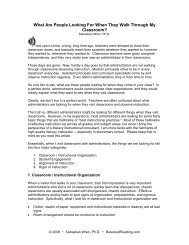The Abecedarian Reading Assessment - Balanced Reading
The Abecedarian Reading Assessment - Balanced Reading
The Abecedarian Reading Assessment - Balanced Reading
Create successful ePaper yourself
Turn your PDF publications into a flip-book with our unique Google optimized e-Paper software.
<strong>Abecedarian</strong> Overview<br />
Effective reading instruction begins with assessment. Individual children come to class with<br />
such diverse literacy backgrounds, it is not safe to assume that they will all learn to read the<br />
same way and that they will all benefit equally from classroom lessons. <strong>Reading</strong> is a skill,<br />
and as such, teachers should begin by determining what skills and knowledge each child<br />
already has, and the teacher should customize instruction to the individual learning needs<br />
of the students (see the section titled “D is for Developmentally Appropriate Instruction” at<br />
www.balancedreading.com). Just as the piano teacher finds out what a pupil knows<br />
about music before beginning instruction, so too should a reading teacher find out what a<br />
student knows about reading.<br />
<strong>The</strong> <strong>Abecedarian</strong> was designed to provide diagnostic information about early reading skills.<br />
Using this assessment information, teachers can maximize their effectiveness by<br />
individualizing their instruction to each student’s learning needs.<br />
Criteria<br />
<strong>The</strong> <strong>Abecedarian</strong> is divided into 6 major subtests. Most of these subtests are further<br />
broken into a variety of tasks. <strong>The</strong> subtests and the tasks were selected and created with<br />
the best research information available (see Appendix A). Research has clearly shown the<br />
benefits of developing all of the knowledge domains tested by the <strong>Abecedarian</strong> early. <strong>The</strong><br />
preponderance of research evidence suggests that children who have phoneme awareness<br />
in kindergarten are much more likely to be successful readers in third grade than children<br />
who lack phoneme awareness. Similarly, knowing the letters of the alphabet is one of the<br />
best predictors of reading success. <strong>The</strong> same is true of knowledge of the alphabetic<br />
principle and word recognition skills. Vocabulary knowledge both predicts and is a result of<br />
reading success, as is decoding fluency.<br />
It is recommended that all students be able to pass the Letter Knowledge, Phoneme<br />
Awareness, and the Alphabetic Principle subtests by the beginning of the first grade<br />
(passing being no more than two errors). By the end of the first grade, students should be<br />
able to pass the rest of the subtests. Students who are still struggling with any of these<br />
measures in the second grade are at a very high risk for reading failure (See information on<br />
the “consequences of reading failure” and the “Matthew Effect” at<br />
www.balancedreading.com).<br />
Ground Rules<br />
It is probably not necessary to give every part of the <strong>Abecedarian</strong> to every student -<br />
teachers should be strategic. For example, if a student passes the Decoding - Fluency<br />
section, it is surely not necessary to give that student the Letter Knowledge or Alphabetic<br />
Principle assessments. Similarly, if a student is struggling with the Letter Knowledge<br />
assessment, then it is unlikely that student will perform well on the Decoding section.<br />
<strong>The</strong>se assessments increase in difficulty (see flowchart), and the teacher should take that<br />
<strong>Abecedarian</strong> <strong>Reading</strong> <strong>Assessment</strong> • www.balancedreading.com • Page 1



